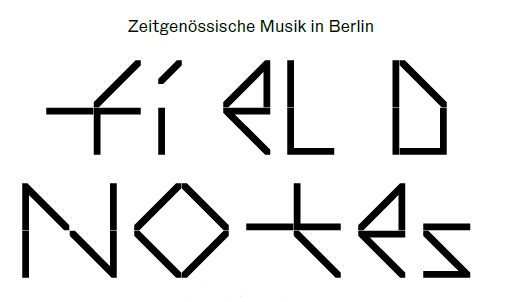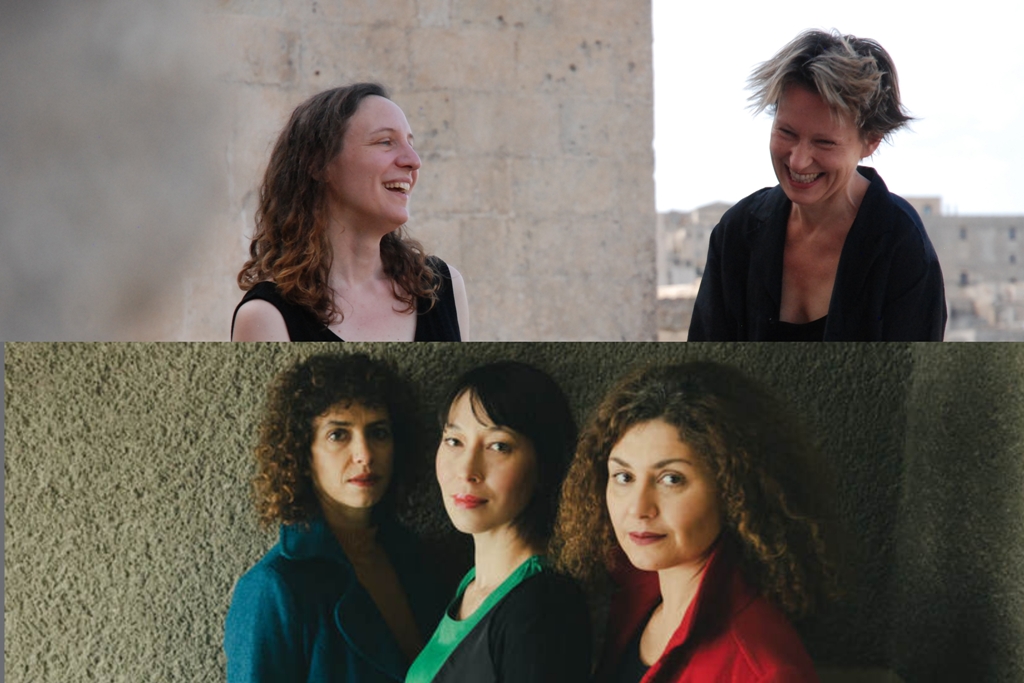Saturday, 14 May, 2022 - 20:30
JANE IN ETHER /// SILVIA TAROZZI & DEBORAH WALKER
Silvia Tarozzi
Biliana Voutchkova
Miako Klein
Magda Mayas
Deborah Walker
JANE IN ETHER (Miako Klein, Magda Mayas, Biliana Voutchkova)
SILVIA TAROZZI & DEBORAH WALKER
Canti di Guerra, di Lavoro e d’Amore(Songs of War, Work and Love) – A contemporary re-interpretation of female folksongs of northern Italy
+++ English below +++
Jane in Ether
Miako Klein – Blockflöte / Pätzold
Magda Mayas – Klavier
Biliana Voutchkova – Violine, Stimme
Das Anfang 2019 gegründete Berliner Trio Jane in Ether besteht aus der Blockflötistin Miako Klein, der Pianistin Magda Mayas und der Geigerin Biliana Voutchkova. Die drei Musikerinnen sind international bekannt für ihre Live-Shows und zahlreiche aufgenommene Werke in den Bereichen Improvisation, zeitgenössische Musik und Performance. Ausgehend von unabhängigen musikalischen Hintergründen, Gattungen und Stilen konzentriert sich das Trio auf die Entwicklung von Echtzeit-Kompositionen, die die dynamischen und klanglichen Möglichkeiten ihrer jeweiligen Instrumente unter Verwendung einzigartiger, unkonventioneller, erweiterter Techniken ausloten. Das Hauptaugenmerk der Gruppe liegt auf der Vielfalt der Klangfarben, die sich aus der Kombination der Instrumente ergeben, wenn sie sich überlappen oder nebeneinander existieren, auf der geduldigen Schaffung von fragilen Texturen, die nur am Rande der Hörbarkeit schweben und spontan die Richtung ändern, um einen dynamischen Raum für dichte Geräuschcluster oder die klangliche Aufhebung von minimalen Klanglandschaften zu schaffen.
http://www.bilianavoutchkova.net/jane-in-ether.html
--
Silvia Tarozzi & Deborah Walker
Canti di Guerra, di Lavoro e d’Amore (Songs of War, Work and Love) – A contemporary re-interpretation of female folksongs of northern Italy
Silvia Tarozzi – Stimme, Violine
Deborah Walker – Stimme, Cello
„Wir arbeiten seit mehreren Jahren an Transkriptionen und Neuinterpretationen traditioneller Volkslieder aus unserer Heimat, der Region Emilia-Romagna in Italien.
Diese Lieder stammen aus den ersten Jahrzehnten des zwanzigsten Jahrhunderts und aus der Zeit des Zweiten Weltkriegs, aber einige von ihnen haben ältere Wurzeln. Die Melodien und vor allem die Texte haben sich im Laufe der Zeit durch mündliche Überlieferung verändert und an verschiedene soziale, berufliche und historischen Kontexte angepasst. Einer der stärksten Einflüsse für unser Projekt ist das Repertoire der Chöre der Reisfeldarbeiterinnen, der "Mondine", mit ihrer typischen Mehrstimmigkeit und ihrem kraftvollen Gesang.
Die Frauen, die während der Monate der Reisreinigung in Gemeinschaft lebten und arbeiteten, entwickelten ein umfangreiches und vielfältiges Repertoire an Liedern; Die Lieder sind die populären der damaligen Zeit, die jeder kennt, aber es wurden auch neue Strophen und neue Melodien geschaffen, und es entstand ein originelles Repertoire.
In unserer Musik entstehen die Lieder durch Klänge, die weit von der Tradition entfernt sind und in der zeitgenössischen Musik verwurzelt sind: Musikalischen Experimenten, die Dissonanzen mit melodischen Impulsen abwechseln, Bruitismen mit ungreifbaren harmonischen Klängen.
Geige, Cello und Stimme werden zu Elementen einer neuen chorischen Polyphonie, in der sie bestimmte Aspekte des Gesangs oder der Struktur traditioneller Lieder hervorheben. Die menschliche und soziale Geschichte dieser Frauen geht uns sehr nahe: Es sind die Geschichten unserer unserer Großmütter, die zu Hause, auf Dorffesten oder in der Schule weitergegeben und gehört wurden, als Frauen und Männer kamen, um den Kindern ihre Kriegserlebnisse und ihr Leben auf den Feldern zu erzählen und vorzusingen.
Heute, immer weiter entfernt von dieser Zeit und von der Chorarbeit auf den Feldern, wollen wir eine Erinnerung wachrufen, eine Tradition durch eine persönliche Sprache wiederbeleben. Berührt von der evokativen Kraft dieser Frauenstimmen und der Stärke ihrer Lebenserfahrung in der Gemeinschaft, skizzieren wir ein emotionales Territorium, in dem unsere Beziehung zu den geografischen Koordinaten und der Geschichte der Region Emilia mit anderen Klängen, anderen Orten in Resonanz tritt. Zwischen mündlicher und notierter Musik wird die Tradition neu erfunden und transformiert.“
Gefördert von der Berliner Senatsverwaltung für Kultur und Europa
Medienpartner: Digital in Berlin
Einlass: 20:30 Uhr
Konzertbeginn: 21:00 Uhr
Tickets (nur Abendkasse): 9 €
+++ English +++
Jane in Ether
Miako Klein – recorders / paetzold
Magda Mayas – piano
Biliana Voutchkova – violin, voice
The Berlin trio Jane in Ether, founded in early 2019, is comprised of recorder player Miako Klein, pianist Magda Mayas and violinist Biliana Voutchkova. The three musicians are internationally renowned for their live shows and numerous recorded works in the fields of improvisation, contemporary music, and performance. Originating from independent musical backgrounds, genres, and styles, the trio concentrates on developing real time compositions exploring the dynamic and tonal possibilities of their respective instruments using uniquely unconventional extended techniques. The primary focus of the group resides in the variety of timbres that arise from the combination of instruments as they overlap or coexist side by side, on patiently creating fragile textures which hover on the edge of audibility only to spontaneously shift direction creating a dynamic space for dense clusters of noise or the sonic suspension of minimal tonal soundscapes.
http://www.bilianavoutchkova.net/jane-in-ether.html
Silvia Tarozzi & Deborah Walker:
Canti di Guerra, di Lavoro e d’Amore (Songs of War, Work and Love) – A contemporary re-interpretation of female folksongs of northern Italy
Silvia Tarozzi – voice, violin
Deborah Walker – voice, cello
„We have been working for several years on transcriptions and reinterpretations of traditional folksongs from our birthplace, the Emilia-Romagna region in Italy.
These songs come from the first decades of the twentieth century and from the period of the Second World War but some of them have older roots. The melodies and especially the lyrics have been transformed over time through oral transmission and adapted to different social, working and historical contexts. One of the strongest influences of our project is the repertory of choirs of female rice-field workers, the “Mondine”, with their typical polyphony and powerful singing. Women working and living in community during the months of the rice cleanse learn, develop and share a vast and varied repertoire of songs; the most beautiful voice is naturally elected as a soloist and all the others are the chorus. The timbre of voice is the right one for open spaces: a call, a full-bodied voice. The sound tension pushes the singers to go up in pitch, so that the energy increases verse after verse. The songs are the popular ones of the time, which everyone knows, but new stanzas and new melodies are also created and an original repertoire is born.
In our music, the songs emerge through sounds far from tradition, rooted in contemporary musical experimentation, alternating dissonances with melodic impulses, bruitisms with draperies of impalpable harmonic sounds. Through a game of reinventions and transformations, we translated the sound and stylistic characteristics of this repertoire. Violin, cello and voice become the elements of a new choral polyphony, in which they highlight certain aspects of the vocals or the structure of traditional songs. The human and social history of those women concerns us closely: they are the stories of our grandmothers, transmitted and heard at home, at village festivals or at school, when women and men came to tell and sing to children their experiences of war and their life in the fields.
Today, further and further away from that time and from the choral work of the fields, we wish to evoke a memory, to revive a tradition through a personal language. Touched by the evocative power of these female voices and the strength of their community life experience, we sketch an emotional territory where our relationship with the geographical coordinates and the history of the region Emilia resonates with other sounds, other places. Between oral and notated music, tradition is reinvented and transformed.“
Supported by the Berliner Senatsverwaltung für Kultur und Europa
Presented by Digital in Berlin
doors: 8.30 pm
concert starts: 9.00 pm
Tickets (box office only): 9 €



As part of the series biegungen im ausland
